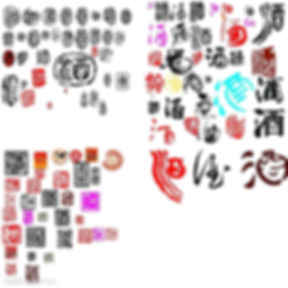Thinking about Drinking Revisited: Part 1
I have rewritten what I wrote 5 years ago. I have divided for easier reading 2 parts. In Part 1, I wish to conjecture from 2 social theories to explain why we drink wine. I also summarized what I had read about later writings on the subject. In Part 2, I will substantiate with examples in the local wine scene. My motive is to explain wine drinking and wine writings from another angle. Theories are used here for conceptualization thoughts so that I can conjecture for Part 2 with some grounds. My intention is not to toy with ideas and appear 'great'.
Part 1
The 2 Theories simplified
Functional and Exchange Theories on the other have been commonly used to explain almost everything within the Society.
Functionalists said that everything existed to perpetuate the world. Wine drinking existed for a reason.
Exchange Theorists explain the world existence because of 'exchanges'amongst social animals. We came together to this wine world with a view for meaningful exchanges through consuming wines. These exchanges include self-actualization, money, friendship, fame, sex, respect and a host of other meanings.
I would conjecture that if functionalism concerned more the objective structure for causing the behaviours of drinking, then Exchange Theoriesenergized our attention to the emotive elements of the individuals.
Wine Functionalism
Plato had been a wine drinker; he warned us about not to overdo drinking. Socrates testified his agreement to Plato's view with his own personal action: he drank much more than his students in tutorials, and he was still able to guide the discussion.
What really were good wines? Classical scholars could have thought thatgood wines were to serve the well-being of the Nation: good wines should have made us 'moral' enough after the consumption. Good wines would make us a better citizen. So obviously the classical scholars were not talking about aesthetics or hedonism; they were 'Functionalists'. To me, this invaluable insight should always be with us if we are for better wine etiquette.
Hume wrote about the dialectic interchange of subjectivity from objectivity; he also talked about morality as reflection of taste as well. He thought that a pure judgment of taste was in fact subjective as it referred to the emotional response of the subject and was based on the 'esteem' from an object itself. Some 6 years ago in a lecture, I infused this point to explain what is a good wine elaborating on balance, complexity, intensity, length, typicite and the like in a tasting class to make it more interesting, I met quite strong rebuffs from a student.
To Kant, this universal validity was not derived from a determinate concept of beauty; it is from common sense. That, in my view, was Functionalism disguised. Classical social and economic theorist such as Marx and Hegel could have said that the consciousness of what a good wine really was about depended on one’s existence in his Class. I quite agree to this point.
Could the study of wine be taught? Probably both Kant and Marx would have said 'no', as everyone according their theories would be so bonded to the Class they ‘belonged' to and as such wine(even if we classfy it as a psuedo-science)could not be taught at all. Are all wine societies 'equal'? Indeed some societies are 'more equal'.
Wine for Exchange
The Exchange theorists drummed on a different beat; they gave a sustainable perspective on how to look into the nature of wines tastings.
Kent Bach discussed about the psychological satisfaction of ‘Higher Communication', the creation of ‘good self-impression' without being all that good, finding out not any of the wine tasters could be really wrong (in the wine comments), among others. He pointed to the 'unaccountability' of almost all wine writings. This, to me, was a very attractive explanation for the charm of wine tasting and the existence of wine judges, wine critics and wine commentators.That ‘the satisfaction of verbal communication made dull topics more interesting' was also included as a motive a la style Exchange Theories to explain why we might wish to exchange in wines.
Kent Bach had also applied classical conditioning concepts as in the tautaulogical, ‘cause-and-effect‘, Conditioning Stimulus and Unconditional Stimulus’ framework. I like this explanation. That sheds light on alcoholism and 'love' for wines.
Keith and Adrienne Lehrer talked about the obvious joy of showing due diligence and care in 'filling in’ the meaning during wine communications, which we had got to do especially when one was to impart what he had learnt to the novice. I thought about some wine bluffs.
Justin Weisberg and Professor John Dilworth applied the concept of Veblen Effect to explain the interactive exchange through wine drinking. They justified wine tasting as manifestations of higher culture, snob goods, expensive and exclusive exchanges, sharing of rarity, and ego-boost. Other writers also talked some common sensical but well-accepted explanations such as ‘sense and sensibility’, pure hedonistic pleasure, or just ‘show-off’, to put it blunt for the for want of wine tastings. Do I need to elaborate the obvious?
Some thoughts
Wine drinking itself exists a host of reasons. As liberal students of wine, we don't mystify, according many a lot of social theories and philosophers. Alcohol consumption, and in this case wine drinking for the purpose of this little writing such as the often quoted Li Bei's 'Let's Have Some Wine'(李白 "将进酒") is an over-simplification. Some six years ago, I received a beautifully crafted(made of silver) icon from my lovely students with the words 'Express Yourself'........






















